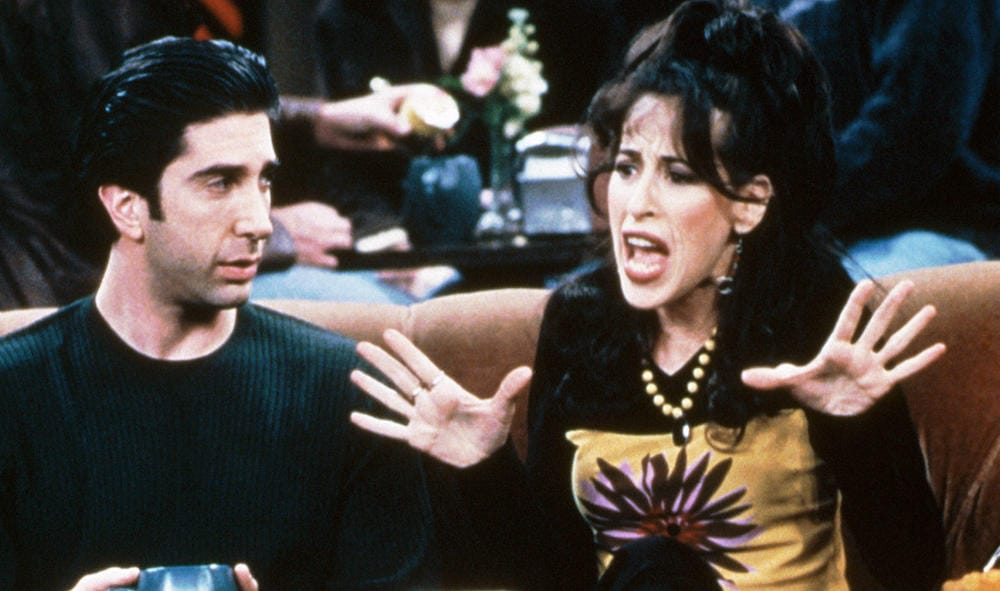The Compelling Case for Careful Self-Promotion
Women are told to lean in and dare to lead, to be a girlboss and to speak up. But nothing is easy about this. And none of it is risk-free.

The Persistent is available as a newsletter. Sign up here to get it delivered to your inbox.
An excellent piece of advice I got from an author friend before I published my book earlier this year, was never to read the reader reviews. “The internet is nasty,” he warned me. “Don’t do it.” And so I didn’t. Until—inevitably—I did.
To the surprise of absolutely no one, including myself, it turns out my author friend was very, very right. A prodigious number of comments came from that army of faceless armchair critics spewing bilious, vile and personal remarks. Some were snidely mean. Some were baseless. Many were just plain ill-informed. I’m convinced many of these so-called critics had never laid eyes upon my book, let alone read it.
Did anyone, anywhere have anything nice to say? No doubt they probably did, but I wasn't seeing it thanks to negativity bias (the idea that our brains are hardwired to dwell more on the negative than the positive).
Until I was.
“This shit was actually fire,” a comment began on Goodreads, and then went on in the same vein. “I loved how the book was a timeline, it gave me every little bit of info and context I needed.”
I was stunned. I was thrilled. But I was also bewildered.
Unsure of how to process all of this pride and disbelief—a caressed ego, but also a weird twinge of something akin to shame for experiencing all of those nice things—I wrote to my editor (Hi, FD!).
“Can I brag for a second about one tiny thing?” I Slacked her, impulsively.
“OMG. YESSSSS. 👂” she wrote back.
And thus began my journey into the fascinating and infuriating world of self-promotion, humblebrags, “boomerasks” and, yes, a healthy dose of sexist cultural norms. This is the real world, after all.
A Delicate Balance
When it comes to being successful at work, one of the toughest challenges relates to cracking “the confidence code,” something that the journalists Katty Kay and Claire Shipman describe as “the science and art of self-assurance” in their eponymous book.
Over the decades, women have been instructed to lean in and to dare to lead—to be a girlboss and to speak up. All of this also means embracing opportunities to self-promote and to be your own most ardent champion; to highlight your competence whenever possible.
But absolutely nothing is easy about this. And absolutely nothing is risk-free.
Remember the paradox of female success that America Ferrera’s character Gloria so explosively details in the Greta Gerwig’s Barbie movie? It’s a zinger of a speech, bemoaning the fact that “you have to be a boss, but you can't be mean.” That you have to lead, “but you can't squash other people's ideas.” That you have to “always stand out” but also “never show off, never be selfish, never fall down, never fail, never show fear, never get out of line.”
This is rarely more relevant than when a woman is trying—deservedly, of course—to highlight her brilliance while avoiding the perception of arrogance. It’s a balance that’s so hard to strike, and frankly so exhausting, that many just don’t bother.
“I know I’m good at my job, and that’s enough for me,” the collective thinking might go. But the gender bragging gap (I know, I know, I’m bored by this gender-whatever-gap construct too) is real. It’s not going away, and it’s worth exploring its prohibitive and enduring costs.
Humblebrags and Boomerasks
Let’s look at the evidence.
“No one likes a braggart,” Leslie K. John, a professor at Harvard Business School, wrote in a 2021 article entitled (aptly, I might add), Savvy Self-Promotion. “Numerous studies have shown that a person who brags is seen as (and is often also being) egotistical, insecure, and inconsiderate,” she pointed out.
She went on to explain that, generally speaking, those who talk themselves up are “not perceived as any more competent than their humbler counterparts.” In fact, “self-promotion has actually been associated with worse performance reviews—particularly for women, who are penalized more heavily when they boast.”
To be clear, both men and women are likely to suffer negative consequences if they brag too much, but with women it tends to happen much sooner than with men.
Separate research shows that the humblebrag—in which a boastful comment is thinly disguised as a complaint (Think: “I’m exhausted because I’ve worked more hours than anyone else on the team.”) can actually have an even more detrimental effect on reputation.
Coined in 2010 by Harris Wittels, the executive producer of the NBC show Parks and Recreation, the humblebrag has particularly come into its own on social media, with LinkedIn being a prime space for bluster disguised as modesty.
And “boomerasking”—the act of asking someone a question with the goal of them reciprocating and giving you the chance to brag (say, someone asking, “how did your performance review go?” just to be given the chance to answer the same question)—can be tricky too.
“People catch onto this pretty quickly,” Michael Yeomans, an assistant professor of strategy and organizational behavior at Imperial College London, said in a recent interview. “They can see the insincerity.”
Other academics have also found that these tactics can swiftly backfire. “Ask-brags and ask-complaints are… erroneously believed by the asker to leave a better impression than overt disclosures,” academics from Yale and Harvard noted in 2019. “The strategies are commonly deployed, but are quite ineffective. Recipients realize that ask-braggarts and -complainers have little interest in their response, but are instead setting up their own disclosure.”
So it’s time to stop with the faux-modesty. It’s time to quit the half-hearted, fake humility. Because, when done right, careful self-promotion can be profoundly powerful. And frequently it is done right, and that can be hugely helpful, especially, as you might’ve guessed, for men.
A Persistent Mystery
In a 2019 paper, two academics—Christine Exley, of Harvard Business School, and Judd B. Kessler of the University of Pennsylvania—established precisely this: Men are more likely than women to brag and when they do so in a careful and nuanced way, they often reap real rewards.
The pair studied 1,500 individuals who were trying to get recruited to do jobs through a workforce crowdsourcing platform run by Amazon.
They challenged each participant to complete an academic test, estimate how many questions they thought they answered correctly, and then evaluate their performance on a scale from 0 to 100.
The researchers found that in their sample of workers, men, on average, rated their performance at 33% higher than equally-well-performing women. The men’s self-promotion paid off, too: It resulted in a higher chance of getting hired for a job, at higher pay.
Exley and Kessler found different variables either enhanced or reduced both genders’ willingness to self-promote—when there were financial incentives, for example—but that the gender gap always remained: Whatever the conditions, women were less likely to toot their own horn.
So what is the reason for the gap? “At this point we can only speculate,” the duo concluded in an article about their research.
Still, there are robust speculations, including things like the potential for backlash. In other words, because of social conditioning and cultural beliefs about how certain genders should act, women tend to get punished more for self-promotion than men. It may well be the case that women have internalized that risk and, as a result, avoid showing off too much.
‘Share When Asked’
For now—based on my own experience of navigating a world in which, as Barbie’s friend Gloria so wisely asserts, “it’s so hard to ever get anything right”—here’s my advice: Own your successes.
Or to put it in Leslie K. John’s language, “share when asked.” Yes, she writes, “humility is admirable. But if someone requests information or an answer that requires you to reveal positives about yourself, you should oblige.”
And I’ll add one thing: If someone mentions their success, don’t be too reluctant to mention yours, provided it’s relevant and interesting. “Oh you just ran the New York marathon? I’ve just qualified for Boston!” Or, “Congratulations on your promotion. I just won my first Nobel.” That doesn’t have to be bragging. It can just be conversation. (And no, I haven’t won a Nobel. That was a hypothetical in case you’re wondering.)
A Call to Promotion
A separate study I recently came across, published in 2013, showed that women tend to undervalue their contributions when assessing work that they have done collaboratively.
In many cases, "women gave more credit to their male teammates and took less credit themselves," the researchers found. But here’s the real kicker: “Women did not credit themselves less when their teammate was female."
Sure, many women are likely doing this subconsciously, as Exley and Kessler suggest (I’ve got my eye on you, oh centuries of oppressive gendered norms and stereotypes) but recognizing it is an excellent step forward and a first step to controlling it.
So consider this a call to action. Maybe even a call to promotion. Because the gender bragging gap—or the gender self-promotion gap, if that’s more palatable—is one that we can feasibly control. And that means we can take it into our own hands to close that gap before another two-hundred-plus years go by.
Leaning in may be impossible, getting paid what we deserve may be a far cry from our reality, becoming the boss may not be on our dance card, but here’s what we can do: We can honor who we are and what we’ve done by being honest and being straight. Sure, my book didn’t make the bestseller list, but guess what? Someone thought that shit was actually fire and I’m proud of it.
So, dear reader, what have you got?
✏️ Josie Cox is a journalist, author, broadcaster and public speaker. Her book, “WOMEN MONEY POWER: The Rise and Fall of Economic Equality,” was released earlier this year.
🎨 Susanna Harrison, is a proud mother, illustrator, and stationery shop owner, living creatively in Newcastle, Australia. She spends her days drawing and wrapping up stationery treasures for customers in her little store/studio Paper Caravan.











